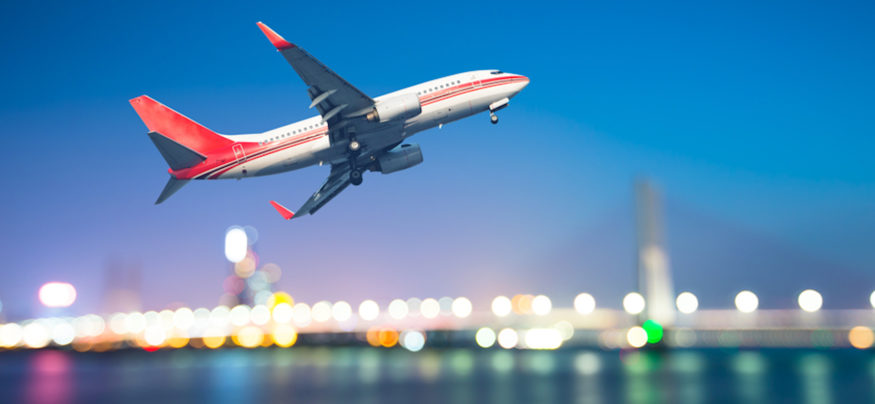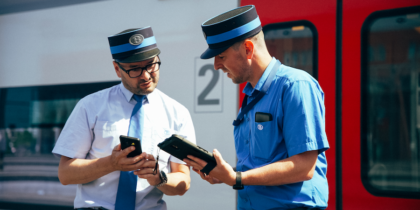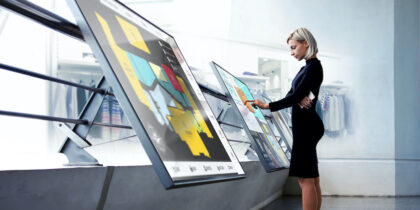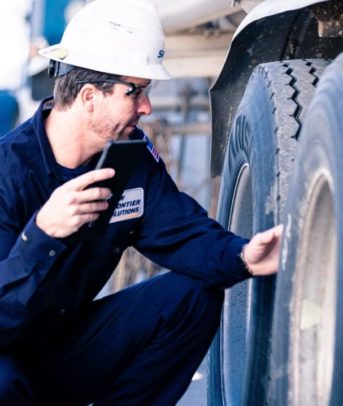Pilots began adopting consumer devices as electronic flight bags (EFBs) in 2011. Since then, the airline industry has rapidly deployed mobile technology within other groups supporting flight operations, resulting in the development of a powerful EFB network that’s set to take off.
EFBs were originally intended to replace the large paper volumes of aeronautical charts and flight manuals stacked throughout the flight deck. Due to the success of this effort, most of the world’s airlines now have a basic EFB program that’s replaced many of the paper manuals and charts pilots regularly used. These “first generation” EFBs greatly increased pilot productivity and significantly reduced the weight of the aircraft.
Using the knowledge gained from the flight deck EFB programs — and with all regulatory hurdles cleared — airlines are now seeking to streamline other areas of flight operations through advanced mobile peer-to-peer network solutions. Airline employees are always on the go, and a stable digital workplace is essential for these mobile employees to stay connected and productive.
The second generation of this technology includes mobile solutions for flight attendant use. Flight attendants face many of the same operational challenges as pilots, including safety inspections, irregular work hours and a complex regulatory environment. They’re not only charged with keeping the passengers safe, but they’re also the airline’s most visible and customer-facing employees. Flight attendant mobile solutions will transform the aviation industry through point-of-sale (POS) systems, operational continuity and delay analytics.
POS
Most airlines employ some sort of mobile device for point-of-sale transactions using credit cards. Traditionally, these mobile devices have been proprietary credit card readers that had no other function beyond point of sale. These devices were typically stored onboard the aircraft and experienced issues with battery charging and reliability, and had limited capability to transmit the cached sales files. But certain airlines are taking advantage of rapidly evolving point-of-sale technology. For example, Frontier Airlines leverages Samsung tablets for POS while also providing a platform to fulfill other flight operations needs. The same device can now be used for POS, flight attendant manuals and advanced communication tools.
As illustrated by Frontier, point-of-sale technology can now provide much more than simple credit card processing. By pairing point-of-sale technology with customer profiles, airlines are also able to provide an amazing experience for loyal customers by reviewing previous purchases, seat preferences and even complaints filed by that specific passenger. Through understanding passenger preferences, flight attendants can provide a customized passenger experience that captures the loyalty of the individual traveler.
Operational Continuity
Operational issues including weather delays, broken airplanes and overcrowded airports will continue to plague the airline industry. While these challenges will never disappear, improvements in the mobile workplace will allow for quicker problem identification and resolution. Pilots, flight attendants and customer service agents are the eyes and ears of the operation and can provide immediate and insightful perspectives into the root causes of delays. Transmitting this information back to the airline’s operations control center is extremely difficult using traditional communication methods, but Samsung technology paired with Comply365’s electronic flight bag and full suite of products can ensure operational continuity is maintained.
ProChat by Comply365 can be easily deployed across a range of Samsung mobile devices to ensure that employees and managers can communicate effectively about operational issues. ProChat uses operational templates to automatically bring the right people to the conversation during irregular operations to quickly highlight issues, discuss them and find resolutions. Even without connectivity, pilots and flight crews can leverage peer-to-peer network technology to discuss onboard events discreetly without alarming passengers.
Many times, crews are tasked with providing emergency medical care to passengers while onboard. Traditionally, flight attendants have had to coordinate with pilots to provide a radio patch with a doctor on the ground. When this happens, the doctor offers advice based on flight attendant observations and passenger vital signs. This data is then relayed to the pilot, and the updates transmitted back to the doctor, who ultimately decides whether to divert the aircraft or continue to the destination based on the information provided. Similar to the game “Telephone,” the original message is often significantly altered after being passed through too many people. Mobile peer-to-peer network technology will revolutionize how airlines care for ill passengers by allowing doctors to see, talk to and monitor passengers directly. Bluetooth technology will be connected to sensors that provide constant monitoring of vital signs, so doctors can immediately sense any significant health changes that may affect their decision to divert.
Mobile technology will also transform how flight crews deal with in-flight turbulence. Pilots constantly monitor transmissions from other aircraft on the same frequency as they relay turbulence reports to air traffic control (ATC). In this manner, pilots build a mental model of their expected ride, but that mental model can be incomplete or inaccurate based on different altitudes and locations within the ATC sector. But many mobile devices used for flight operations are equipped with onboard accelerometers that can sense turbulence. This allows pilots to provide a digital ride report to the company, which can be transmitted through onboard communication networks to alert other aircraft in the area of the location, severity and duration of turbulence.
Mobile technology is revolutionizing the service standard airlines are able to provide. Further, it provides a tool set that flight crew members can use to streamline normal processes and adapt to irregular situations quickly. In addition, mobile devices provide better two-way communication that allows airlines to instantly analyze trending delays to provide a superior and safe customer experience.
Learn more about how Samsung Galaxy tablets made in-flight sales easier and more efficient for Frontier Airlines by reading the full case study here.







